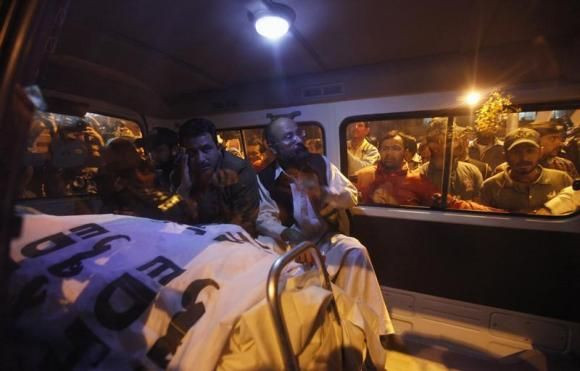Blood Flows in Karachi: Pakistan Taliban Murder Top Anti-Terror Police Chief

One of Pakistan’s top anti-terror police chiefs, Chaudhry Aslam Khan, was killed Thursday in a suicide bombing in the city of Karachi in an assassination that the Tehreek-e-Taliban Pakistan (TTP) – that is, the Pakistani Taliban -- took responsibility for. At least three other security officers also died in the attack on a police convoy in the Essa Nagri neighborhood of the city. The powerful blast completely demolished the bulletproof vehicle that Aslam and his colleagues were riding in, wounding several other people in proximity. Even some nearby buildings were damaged by the force of the explosives.
Aslam had already survived previous murder attempts, including another bomb attack outside his home in September 2011. That incident killed at least eight other people. Pakistani media noted that TTP had repeatedly threatened to kill Aslam and attempted it on at least three previous occasions. The senior police official was widely known for his aggressive campaign against the Taliban. According to The Nation, a Pakistan newspaper, in 2010, militants blew up the head office of the Criminal Investigation Department (CID) in Karachi, with the purpose of killing Aslam and other senior police officials. (Aslam escaped death in that incident as he was not in the building at the time.)
Michael Kugelman, senior program associate for South and Southeast Asia at the Woodrow Wilson International Center for Scholars, described the killing of Aslam as a “devastating loss” for Pakistan. “Aslam was one of the few public figures in Pakistan who enjoyed bipartisan support,” Kugelman said in an interview. “He was brave, tough, and unrelenting in his determination to go after terrorists.”
Pakistani Prime Minister Nawaz Sharif (who has been calling for peace talks with TTP) condemned the attack. "Chaudhry Aslam was a brave officer. We will not let the will of the nation be crushed by these cowardly acts by terrorists," Sharif said, according to Pakistani media.
Dawn, an English-language Pakistani daily, reported that Sajjad Mohmand, a spokesman for the outlawed TTP, said that Aslam was specifically targeted for having conducted various operations against the militant group and for allegedly having killed Taliban prisoners in CID cells in Karachi. The spokesman even added that Aslam was on the “top of our hit list” and that the TTP would carry out more killings of police officials.
Aslam had remained defiant in the face of prior threats to his life by the Taliban. Indeed, in the wake of the September 2011 bomb blast that tore off part of his house, the police chief declared: “I will give my life, but I won't bow to terrorists.”
Karachi, a teeming coastal city of some 18 million people, is awash in crime and violence, both political and criminal. The police in the city have been seeking to capture and clear out both Islamic militants and hardcore criminals, including murderers, gun dealers and drug peddlers. Aslam had specifically declared his intention of wiping out the Taliban from the city.
In an op-ed in the Express Tribune newspaper, columnist Tooba Masood praised Aslam as a “brave man” who “had [the] guts to stand against the Taliban.” “Anytime something went wrong in the city I saw pictures of Chaudhry Aslam – standing, sitting, strolling in his trademark white shalwar kameez [clothing] with his buttons undone, a flashy watch and a cigarette, telling everyone it’s going to be okay, we’re going to get the bad guy,” Masood wrote.
As for the Taliban, Kugelman commented that the murder of Aslam does not necessarily augur a new war by the militant group against the state of Pakistan. “It simply marks the intensification of a long-running war,” Kugelman noted. “For a number of years, the TTP has been expanding its operations and attacks outside of the tribal areas and into key urban areas, including Karachi. I fear we'll see many more attacks like this one, unless Pakistan adapts a robust counter-terror strategy.”
Kugelman also said he thinks Nawaz Sharif’s plan to engage in peace talks with TTP will not be compromised by the sensational murder of Aslam. “While this attack will certainly sharpen the debate about the merits of talking to the Taliban, ultimately it won't lead the Pakistani government to abandon such efforts to launch peace talks,” he stated. “In fact it may [even] embolden supporters of talks, because they can argue that in the absence of a dialogue, the Taliban will simply continue its killing spree and claim the lives of more heroes like Aslam.”
© Copyright IBTimes 2025. All rights reserved.





















